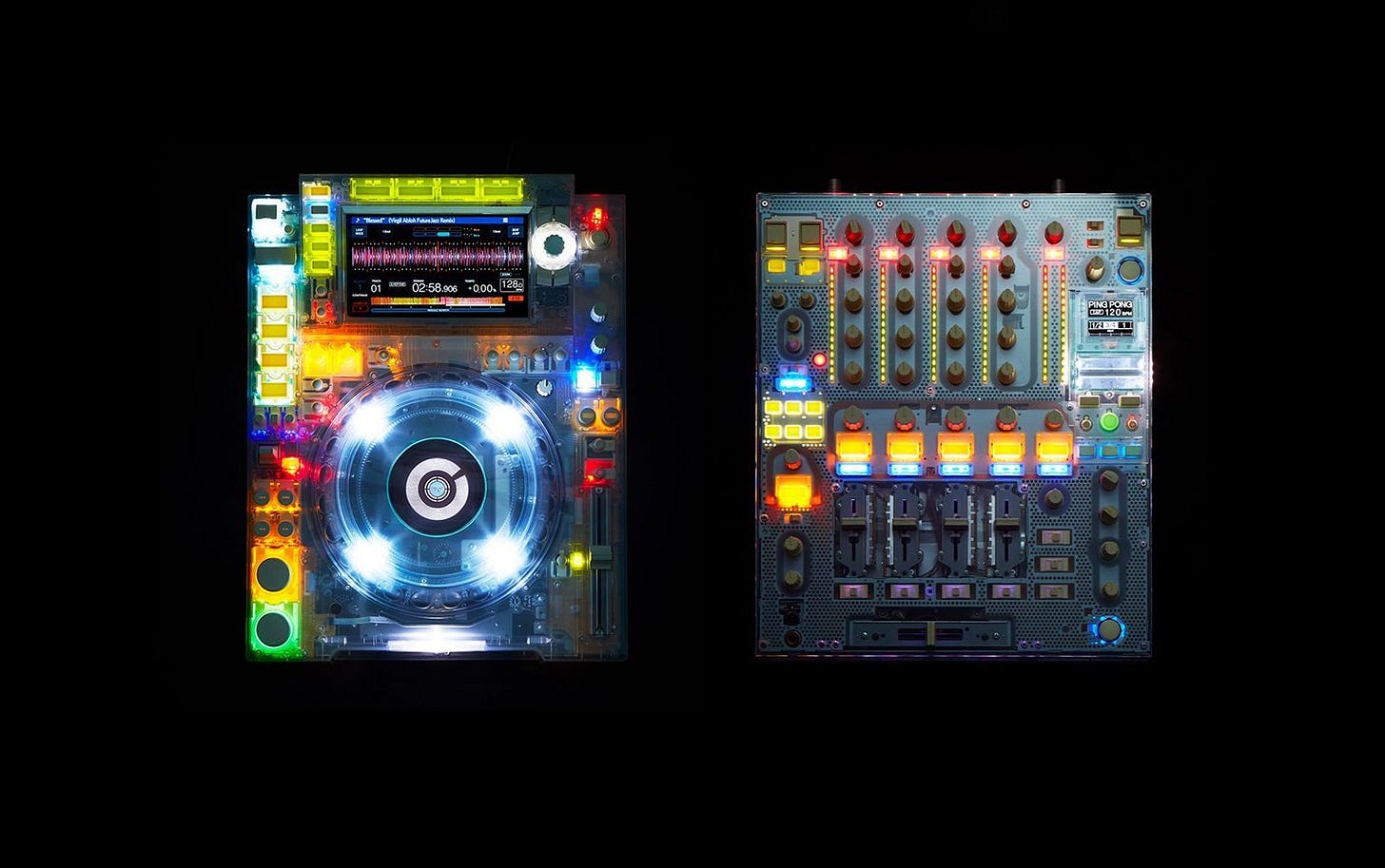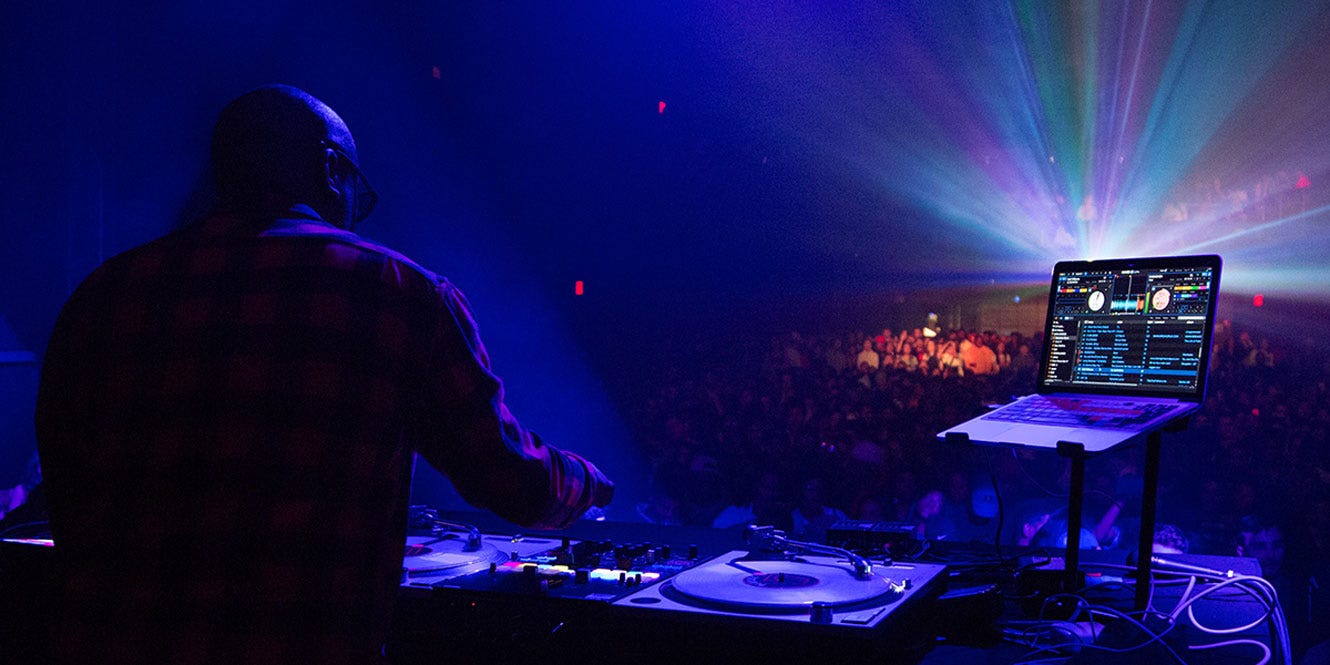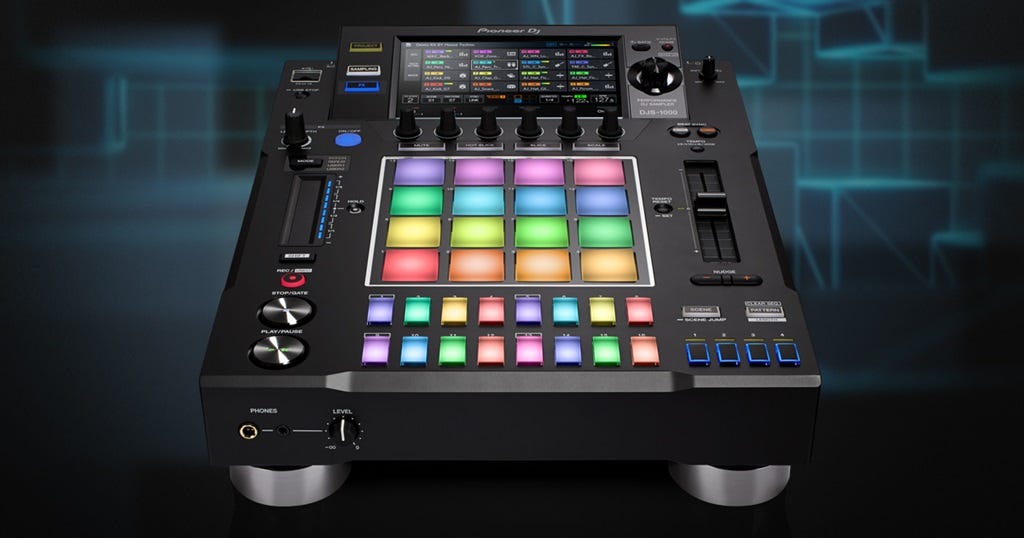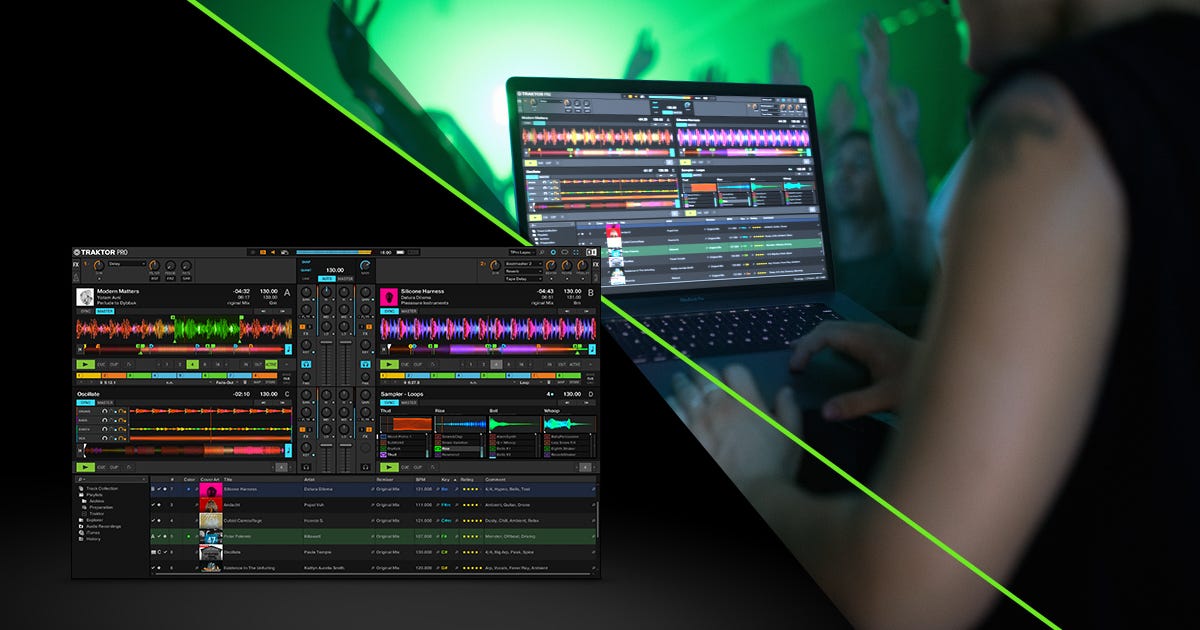Why did Pioneer DJ buy Serato?
Two giants sync up – what does it mean for the DJ industry?
It’s conglomeration summer, baby! inMusic acquired Moog, Native Instruments absorbed iZotope, Brainworx and Plugin Alliance, and now Pioneer DJ’s AlphaTheta has bought Serato, all in the past few months. Although I have no specific insider knowledge – I actually had another newsletter ready to go when the news dropped less than 48 hours ago – I wanted to use this week’s Future Filter to break down some of the reasons I think this merger happened, what it might mean for the two companies, and what the future holds for the DJ industry at large. I’m also aware people, especially Serato users, feel pretty strongly about this and rightly so. This is just my initial reaction, not a full report on the situation.
As always thanks for subscribing and reading – please do share this newsletter or forward it to a friend if you enjoy it.
Declan x
The Week in AI
UberDuck – the infamous AI voice modelling website that clones famous artists and people – is removing user-uploaded models. I’m surprised it took this long.
UK Music has released its Policy Position Paper on AI, a five-point plan on how to deal with AI in music creation and respect artists’ IP, consent and copyright.
OpenAI has signed a six-year deal with stock media company Shutterstock to provide it with “high-quality training data”, that includes music.
Disclosure has teamed up with Bronze.ai to create a generative version of their album ‘Settle’ for its 10th anniversary.
All hail the ecosystem
Over the last decade or more, Pioneer DJ’s business model seems to have been to capture a younger audience with entry-level controllers and apps, train them up in the way of rekordbox and funnel them through to the CDJ, cementing its role as the industry standard for the next generation. Yes, CDJs are prohibitively expensive for 99% of DJs to use at home, but a host of new controllers and all-in-one units allowed younger or less pro DJs to stay within the rekordbox music management platform and/or DJ software and still have their playlists and prep intact if and when they take their sticks to the booth.
Its big pull was undoubtedly the fact that everything you did in rekordbox – hot cues, loops, playlists, metadata changes etc – was mirrored when you took those tracks to a CDJ. The ecosystem was solid, even if rekordbox DJ itself wasn’t perfect.
The impact of the pandemic
The pandemic saw the world shut down and with it an explosion of interest in creative tools. As every club was closed, DJing at home and DJ streams exploded and controllers were suddenly in big demand from pros and amateurs alike.
When I spoke to AlphaTheta’s MD Kei Aikawa for a piece on the pandemic’s impact on music tech for DJ Mag in 2021, he said something which I think is pertinent with the Serato acquisition in mind. “The increased demand and growth for our entry-level equipment has been one of the biggest surprises. This is really positive for the industry as a whole. Hopefully, this means we will see more new talent coming through as a result – helping the industry to thrive and continue to diversify when we return to some sense of normality.”
So, a combination of a huge increase in amateurs trying their hand at DJing and existing DJs needing controllers or all-in-one units for home use and streams saw Pioneer DJ’s sales explode during the pandemic. But why does that matter now?
Stock options
If you think of Pioneer DJ as Apple and Serato as PC, it starts to make more sense. Much like Apple, rekordbox DJ is a closed system – you can only use Pioneer DJ equipment to control it. Serato on the other hand supports third-party controllers – the list of supported hardware on its website gives you an idea of the amount of kit you can use. Keeping everything in a closed system might be great for compatibility but it also means you have to manufacture everything yourself. If there are any bottlenecks in global supply chains, if there’s more demand than you can facilitate or if there are increased shipping or logistic costs, those frustrations and expenses come back to you as a business.
Another aspect of this is the old adage of growth. As a recent video by Benn Jordan on the private equity buyout of the music tech industry explains brilliantly, the explosion in sales of music instruments and equipment during the pandemic was obviously a bubble. Once the world opened up again, people would go back to work, go back to clubs, and back to real life. DJ streams in front of a questionable bed sheet have, sadly, largely disappeared.
But capitalism cannot be reasoned with – growth must continue. When projections miss the mark, share prices drop, even if those projections are based on a once-in-a-century level of demand. We’ve seen this across the whole of the tech industry. Though AlphaTheta itself isn’t a public company, it is part of a bigger holding company called Noritsu Koki Co that floats on the Tokyo Stock Market.
My hunch here is quite simple: Pioneer DJ saw exceptional growth during the pandemic – largely in the entry-level controller space – and struggled to see where that continued growth was going to come from now they’d essentially maxed out their production and market share. They already had a strong partnership with Serato and built several successful mixers and controllers for the New Zealand company’s software. Serato also takes large fees, including from Pioneer DJ, to license their software to compatible hardware. With an acquisition, Pioneer DJ could both avoid paying that fee and also benefit from the extra income from third-party manufacturers, including from their direct competitors like inMusic. It would also mean a huge userbase increase overnight, and in the age of subscriptions, that matters. More on that later.
Yes, Pioneer DJ could have opened up rekordbox DJ to third-party controllers and started selling licenses of their own to manufacturers. But by buying Serato, they’re keeping rekordbox inside the walled garden, segmenting the market (from their perspective) into ‘people who will progress to CDJs eventually’ and ‘people who will never use CDJs’. Now they can benefit from both.
USA! USA! USA!
Serato’s power has always been in the US market, having dominated since the widespread introduction of DVS in 2004 with Scratch Live (rolled out in partnership with RANE now owned by inMusic, oops!) Timecode vinyl records allowed turntablists and hip-hop DJs to hold on to the cultural symbol of the 12-inch while benefitting from the flexibility of software.
Pushing forward with technology while respecting legacy secured Serato’s role in DJ culture in the US, where it still dominates today. Add to that the fact that the mobile DJ market might not be the sexiest side of the industry but it is for sure one of the biggest. More often than not, that means laptops and controllers. Serato’s dominance in the huge wedding, corporate and mobile DJ market – and its hallowed reputation among turntablists and scratch DJs – meant that rekordbox DJ had a big job on its hands when it came to breaking the US when it launched much later in 2015. With this acquisition, Pioneer DJ now control a huge portion of the hobbyist DJ world, mobile DJ world, turntablist world AND the pro club setup world. Cool!
Like and subscribe below
Another point I wanted to make about why this merger may have happened – I stress ‘may’, this is only my opinion – relates to everyone’s favourite two words that have come to dominate all aspects of our very existence: subscription models. While most of the features of rekordbox DJ are available under a free plan, if you want to use it with a controller you need to subscribe, starting at £10 a month (some controllers come with a ‘hardware unlock’ feature that allows you to use rekordbox DJ for free).
Serato too offers a subs plan, but you can also buy the software outright. Subscriptions are something that investors and valuators very much prefer and if my thoughts on the post-pandemic bubble and growth trends above are true, I wouldn’t be surprised if Serato joined rekordbox with a subscription-only Pro version.
The producer
Finally, another aspect of this whole saga is not about DJs at all, it’s about producers. Pioneer DJ has been experimenting with studio kit since the launch of TORAIZ AS-1 mono synth in 2017. Since then, they’ve launched a whole bunch of hardware and software integrations, as well as hybrid kit like the DJS-1000, a pad-based sampler in the form factor of a traditional CDJ. Pioneer DJ also introduced an Edit mode into rekordbox in 2020, to quickly make simple, quantised edits of existing tracks in your library.
Serato on the other hand has always had one foot in the production world, having launched with Pitch’n’Time, a market-leading pitch-shifting, time-stretching app in 1999. More recently, they’ve brought out Serato Studio, a beat-making DAW and Serato Sample, a simple audio editing app. Given that these are basically peripheral tools for both companies, I don’t think the deal would have hinged on these alone, but it won’t hurt that they can both flesh out their producer offering. I’m sure Pioneer DJ will also be keen to get their hands on the tech behind Pitch’n’Time for their own time-stretching and pitch-shifting algorithms.
What happens next?
Those are some of my over-arching thoughts on this merger and why Pioneer DJ came for Serato in the first place. I may have overthought this one – often these things are simpler than we project – but given its potential impact on the DJ industry, I think it’s worth hammering out some wider scenarios.
I’ve discussed why I think it may have happened, let’s take a look at some of the potential outcomes of the acquisition, starting with the software.
Software solidification
Simply put, monopolies are not good. They don’t encourage innovation, they can result in price fixing, they can isolate and tear down independent businesses and competition, they can create artificial scarcity and can manipulate supply chains. I’m not saying any of those things will happen with Pioneer DJ, but when you see one company dominating almost every aspect of an industry, it should and does raise red flags. People are right to be concerned about what the impact of this merger will be in the long term.
Pioneer DJ’s press release attempted to get ahead of the narrative and reassured users that as it stands, both companies and their products will operate as separate entities, explaining:
“While the partnership will capitalise on the combined expertise of both companies, AlphaTheta and Serato will continue to operate as standalone brands. This includes the continuation of their longstanding partnerships with key players in the DJ hardware and software industry.”
It wouldn’t make sense for Pioneer DJ to simply rebrand rekordbox DJ as Serato or vice versa. In my opinion, they fundamentally don’t want to drive people to software. The end goal will always be the CDJ. They simply recognise there’s a market that will never use the CDJ, and they want a piece of that too. With that in mind, I’d expect them to stay true to this promise for the foreseeable. And as I mentioned above, Serato has an insane amount of goodwill among its community and spent a long time building it. Pioneer DJ will be aware of the power of Serato’s brand in the US.
The part about continuing to support existing controllers is also important. Killing support for RANE, for example, just because it's owned by inMusic, would only serve to piss off a lot of people. Maybe inMusic will be the one who kills it, who knows, but I’d expect support to continue for the foreseeable too, even if it is through gritted teeth.
What might change though, is some of the behind-the-scenes features. Serato currently doesn’t offer any cloud storage so perhaps we’ll see a version of CloudLibrarySync move over to Serato. Serato’s FX could also make their way over to RBDJ and vice versa. Serato users would also be delighted if some of the advanced library management features of RB Export mode came to their software.
But overall, I don’t think we’ll see any significant changes in how the two software look, how they work, or what they support, in the short- to medium-term.
Let them eat cake
Pioneer DJ can now have their cake and eat it: a closed ecosystem that funnels every DJ through rekordbox and onto the CDJ so it maintains its industry-standard position, and revenue from a controller and DVS market that capitalises on third-party license fees. And all of that is before you even consider the learnings that rekordbox DJ can take from 24 years of Serato’s software development. But with Pioneer DJ now owning so much of the market, and inMusic owning RANE, Numark and Denon DJ, there are very few major DJ hardware brands that remain outside the control of these two companies.
Software too has been co-opted. Although VirtualDJ and Algoriddim djay boast huge user bases, they’re very much aimed at beginners who likely will either stay put for life or migrate to more pro software once they start craving pro features. Traktor has all but disappeared and although rumours of a bounceback have been circling in recent months, it’s hard to see Native Instruments making their DJ division a priority having just merged with iZotope, Brainworx and Plugin Alliance. Although, Traktor with iZotope and other PA effects would be amazing. Plus, iZotope already has the stem separation tech that’s popped up in both RBDJ and Serato in recent months. I would love to see (another) Traktor relaunch! Or maybe inMusic will take it off their hands…
Speaking of which, inMusic has invested a huge amount in the Denon DJ reboot, with innovative features as part of Engine OS and a far more competitive price point. Maybe they’ll see this as an opportunity to further push out a valid alternative to the AlphaTheta universe.
The end of an era?
As I mentioned above, mergers are becoming the story of 2023. As interest rates rise, both company and investor debt suddenly cost a lot more, and the pressure is on to deliver results, faster. This is why I expect to see several more acquisitions in music tech before the year’s end.
Losing another independent in Serato feels like the end of an era, and now that two companies control the vast majority of both hardware and software, the DJ industry feels more vulnerable for it. Let’s hope Pioneer DJ stick to their promise.
Why do you think AlphaTheta bought Serato? Would love to hear your thoughts.
P.S.: The acquisition is subject to the approval of the New Zealand Overseas Investment Office so it may not happen at all. In which case just forget you read all this.
Other recommended stuff from the internet
Ezra Klein’s latest podcast is a fascinating interview with the MD of Google’s Deep Mind, Demis Hassabis. I couldn’t agree more with Ezra’s point that the narrative, investment and tools are all focussing on the ‘chatGPT’ approach, where AI is trying to convince us it’s human. What’s far more interesting to me is AI that does things that humans simply can’t. A must listen. I also love how he started by building Theme Park! An iconic game.
Everyone loves Hard Fork, right? This is one of their best, an interview with Meta’s Head of Instagram Adam Mosseri the day Threads launched. Apparently, it’s built on the decentralised protocol ActivityPub but those features won’t be available ‘for months’. Can’t imagine it’ll be a high priority for them now given the explosion in growth Threads has seen since launch, but at least they tried? Hmm.





